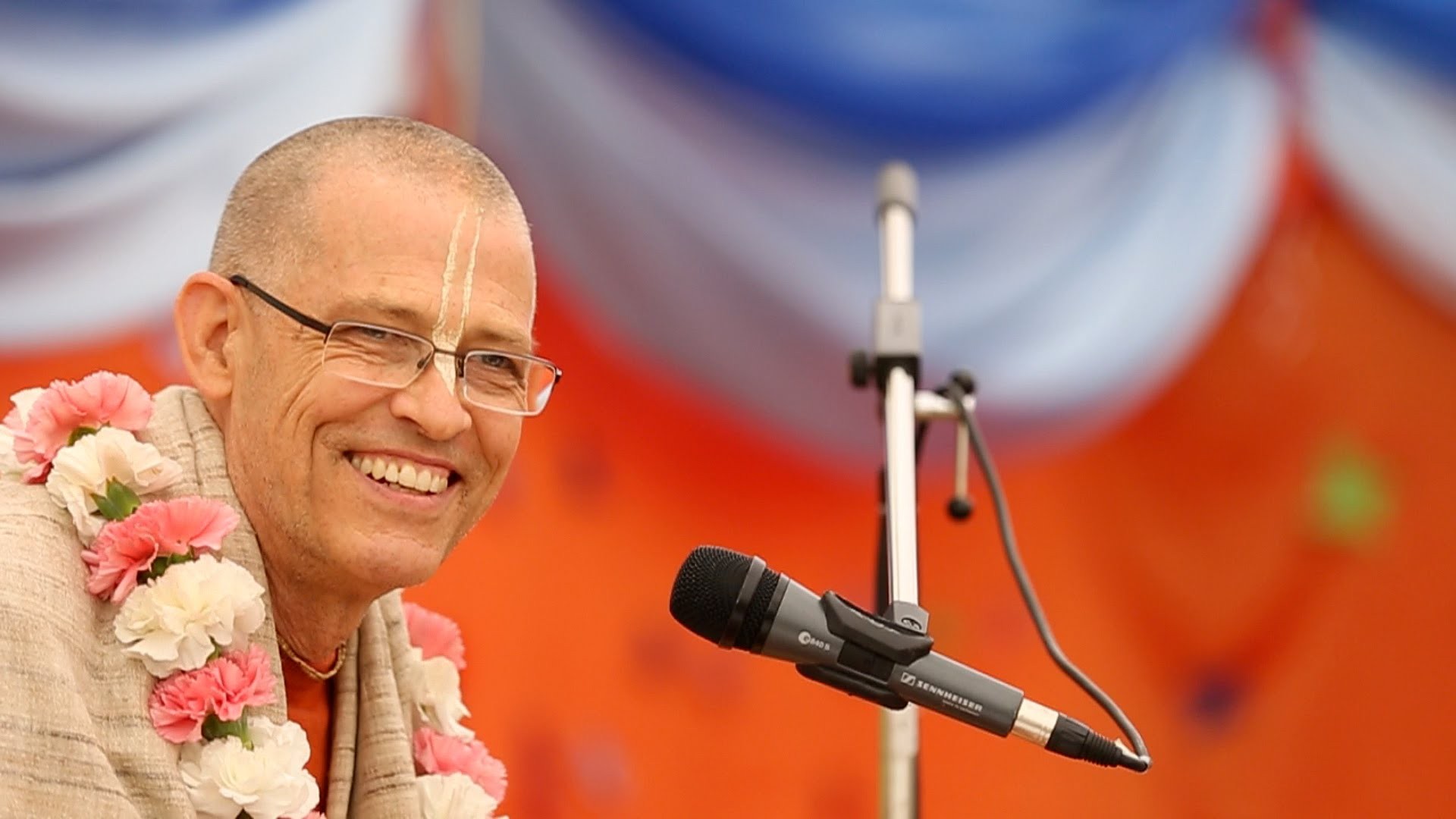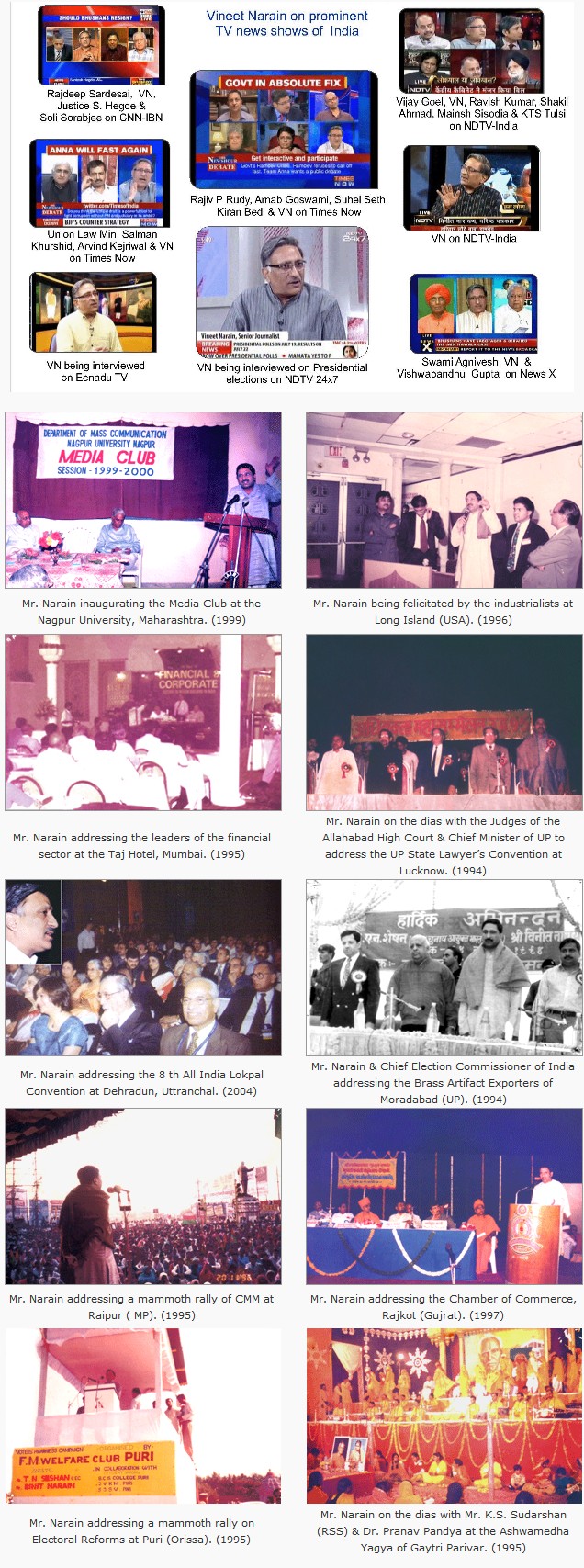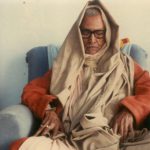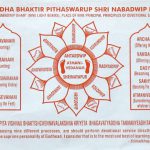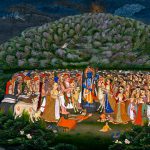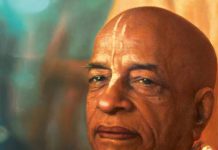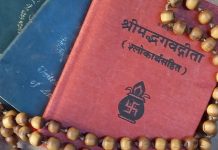Conversation Between
Krsna-ksetra Dasa (now Swami)
and Mr Vineet Narain (Vineet Narain is Editor of Kalchakra, a video magazine for investigative news.)
New Delhi, 1993
KK: So, Mr Narain, perhaps you could first explain something about how you came in contact with the Krsna Consciousness movement?
VN: Well, on different occasions, devotees of ISKCON sort of accidentally met me with a gap of a few years each time. And this was so limited that I couldn`t really understand what is it all about, except that I could see the Westerner in highly devotional mood and very high order of ritual and arati and chanting. Of the performance in Vrindavana temple, that was all I knew about ISKCON; I didn`t know who Prabhupada was, I didn`t know what ISKCON was all about. Of course, one very damaging film was Hare Rama Hare Krishna, by one of the Indian leading stars, which created a very negative image.
KK. So you have seen that film and you had that negative image?
VN. Sort of, yes. I mean, generally, people felt that all hippies are taking to this, because, you remember early in the seventies, Mahesh yogi and Baliyogeshar and so many people went abroad, so gurus were exporting Indian spiritualism to the West. We thought it was part of that. But a few years ago, when a festival was on in India, many Russian people who came in contact with us demanded Russian Bhagavad-gita and we don`t know where to get a Russian Bhagavad-gita from. I made enquiries and they said, ‘Yes, ISKCON does such crazy things, bring out Bhagavad-gita in different languages,’ so I went to look for the ISKCON temple in Greater Kailash in Delhi and finally I found some copies. We gave them to some very important people who wanted to carry it home, so I thought this must be something serious, I mean, Russians asking for it.
At the end of this year, during the month of April, I decided to do as last year, I did the story on the Rajneesh community in Puna. This time I decided to do a story for my video magazine called Chakra – a story on ISKCON. I told my reporter to go and pretend to be part of them, get as much information as he can. Part of it could be in the favour and if there is anything negative, please bring that because that`s how the news is made!
So he went and brought back a lot of literature to read and he also brought back two video tapes; that is, Your Ever Well-Wisher and World of Hare Krsna. The same night I saw both the video tapes; the film Your Ever Well-Wisher especially influenced me a lot. I saw it two times the same night. I was absolutely touched by Prabhupada`s life. Then for thirty days I spent almost all my time discussing with senior devotees of the ISKCON temple about the sastric philosophy.
You see, in the last thirty years, I`ve tried to read the Bhagavad-gita at least ten or twelve times, but I could never go further than the third or fourth sloka. I`m a Sanskrit scholar, but the Gita never attracted me like that. This time, when I got Prabhupada`s Gita, now I`ve already read it twice, and I`ve started marking up slokas and quoting them in my discussion. I found that Prabhupada`s philosophy, the way he describes the philosophy, his style-presentation, is very lucid, very straightforward, very relevant and very simple to understand, and I feel that that should be encouraged more. I was very influenced, I was very interested.
KK. I see that you are wearing Vaishnava tilaka, so this indicates that now you are committed to the process of Vaishnavism?
VN. It took me quite a while to do these things, even within the temple premises, being a professional journalist and that, too, for political journalism one has to maintain an absolutely objective image. If you get aligned to a group or to an ideology or to a political party or philosophy, it is not considered very good, because then they think that your stories are planted. So in general within this profession that is the feeling. So you have to be careful. A good journalist would never like to align with a certain group. So I tried that and I was very careful and I intentionally resisted showing any external symbols of my devotional interest or inclination. But of late, when I started to enjoy the transcendental bliss of devotional life, I`ve started practising these things within the temple premises or with the devotees, but not in public; I would not go and conduct a political interview with tilaka on.
KK. As I explained, we are trying to develop an understanding amongst the public, especially in the West, a proper understanding, a proper appreciation of Krsna consciousness, and we find that it is not very easy. We find that people have so many preconceived notions, they have the tendency to lump us in with so many of these various groups who are, as you say, exporting the idea of Indian culture. Would you have any advice which you can give to the devotees how to actually do this?
VN. As you know, we journalists are very fond of talking, so whoever you meet you talk to, and nowadays I`m trying to follow Mahaprabhu`s order, so I am trying to find out what people are thinking about ISKCON and finding out from the people who matter in this country, the decision-makers, without revealing my interest in the philosophy – ISKCON and Bhagavad-gita and Prabhupada`s philosophy. I was very surprised that the majority of them have no opinion, a negative opinion, or they are indifferent. They have very little understanding of what ISKCON actually is, so it seems that much greater effort is required to concentrate on these decision-makers, how they can be made more aware of the whole thing, and the best thing to do that is the media.
But I can see the difference between print and electronic media because in a third world country like India, reading habits are very poor and eighty per cent of the people are illiterate, so generally there is no reading culture. That`s why cable television and satellite television have picked up so fast. It is much easier for people to look at the television than to read, if some show is on, video-cassettes are available, you can put on cable television or satellite or something like that, mass reach will be there. And what`s interesting in this country, ordinary country politicians and decision-makers get influenced by a group even when it has no credentials, if it is accepted in the society by the masses, because their focus is always the voting pattern. So if they think that the voters are getting interested, they will also pretend to be interested in this. So there are two ways of tackling them: one is that we invade the masses and we have to literally invade them; the other is that we concentrate on educating people more about the philosophy of ISKCON.
What I feel is that the devotees of ISKCON who go out for preaching, we take the other person as if he is a fallen soul and he needs immediate treatment, so we start giving a heavy spiritual dose. And as you know, it is Kali-yuga, so not everybody is inclined to accept this Krsna consciousness. I would accept it if the preacher would not go in the external appearance as a preacher. Devotees who are well placed in society by maintaining their karmi occupation – such devotees should influence people within their peer group.
KK. That`s because people naturally listen to their peers.
VN. That`s right, and if you go to them as devotees you`ll have great resistance. But suppose that somebody has some bad experience in ISKCON guest house or whatever wrong notions they might have, these are carried on. So if an objective person goes to them and talks about it, for example, when I talk to people without mentioning that I am interested in the philosophy, they listen carefully and I bring many people to mangala arati and they enjoy. Mangala arati is one thing you don`t need to preach, you just have to say, ‘Before you go for a picnic, you catch a morning flight at 4.00 a.m. You get ready for a picnic or something like that, why don`t you get ready for this picnic with us? We would like to show you something interesting.’ Don`t tell the details, just bring them to mangala arati. Throw them into the pit and they will realise what it is all about.
KK. Yes, it touches the heart. Do you have any comments for devotees how to develop a better attitude for how to deal with the public, because we tend to want to present ourselves as devotees and as you said, this can be a problem. So devotees have a tendency sometimes to think, ‘Well, anyway, we don`t really care what our image is, our goal is just to satisfy Krishna’.
VN. I didn`t want to say this, but this is what I feel, that if you come out with a very strong stand, the general feeling is that, ‘Well we don`t care because they are the fallen souls, and in any case they will not improve and it`s just their karma anyway.’
KK. That`s a self-defeating attitude.
VN. Well I don`t think that is their spiritual situation, it is only a question of time. People are starving. When I was attached to Ghandian ideology and when I was an activist, I found that anything that you give to the younger generation, anything that you give to these frustrated bureaucrats, anything you give to advise the politicians, they are willing to listen. The only question is how you approach them. So, we are very methodical in approaching these people, and each individual has to be treated differently. There is no universal formula for everybody. So you simply have to understand in journalism when you approach somebody, you don`t go and bang into that person. We do some homework about it, we read about it, we find out about it, we talk to his servant, we talk to his driver, you talk to everybody, and then you find out his mental make-up, his family atmosphere, and you start the conversation by the weakest point he has and he has a natural interest in it.
I have a good example. Suppose somebody`s child is seriously ill, and he has not been cured for six months, so we start to talk about the ayurveda and alleopathy and different medical systems and which is that or that – we don`t just sit down and talk about our business. Then we say, ‘Well we know this person, if you want we can introduce you.’ So the point is, you have to win his confidence.
I can give you an example of a person, . Swami, you must have heard of him, he is a notorious swami, he is very good at winning people, he is a low-class person, he has no spiritual knowledge, not a fine person, he is not very sophisticated in his behaviour, yet at different stages he has cultivated hundreds of influential people in the world. So I asked, ‘What is the secret of your success, how could you cultivate so many?’ Especially as the news about him keeps coming out, he is involved in many international arms deals, but that`s beside the point; the main thing is that he told me, ‘I talk about their personal problems and I start by that, so from that I go to the other side of the fence.’
So we have to approach the people individually, these important people I`m talking about. Again, for ordinary people, if you write an article or you produce a television show, you have to see what is relevant. I give you a very different example; suppose I`m writing about the lay-out of these five thousand year old cities they have excavated, and compare them with Chandigarh or Nysore. They can see how these ancient cities were just as well organised as the modern ones . people can immediately associate. But if we talk about Bhagavad-gita in the Vedic age and it has no relevance to today`s life, then people can be very easily put off.
KK. Prabhupada was very expert at that.
VN. I know, that`s why he convinced me .
KK. You were talking about the present day.
VN. Just this. I found our devotees – I don`t know if I am doing offence by saying this, but our devotees, especially those who are interacting with people, their understanding of contemporary issues is very limited – very, very little. Partly it could be because they have no interest. I can`t blame them because since I have come into this (Krsna consciousness) I also don`t enjoy reading newspapers anymore. I find them very foolish. But if you are up-to-date with what is happening, because that is a breaking point, you see. When you are in a plane, or a train, or a conference room, everybody is talking about that day`s news, so the devotees, those who are going to preach in the field to educated people, should also keep a track of the news.
KK. One idea we have of developing interest amongst the young people of India is having large festivals, where we bring in modern electronic music. We are doing this in Eastern Europe with quite some success, you know modern pop-music style, but chanting the Hare Krsna mantra. Do you think that this would be successful here in India?
VN. Well, this kind of culture is only predominant in metropolitan towns, like Bombay, Delhi, but if you go to Uttar Pradesh or Bihar, they may for some time enjoy but they simply cannot follow the language or music; it won`t be very popular. So, it depends, for different target groups you need a different set of strategy. I feel that the easiest thing today is the cable television, because the reach is tremendous. You produce one programme, I believe that, they recently made a film on gurukula, I`m very keen that that film should be telecast on television or on cable television. The reach is tremendous. I mean you can reach nook and corner with this film; one devotee can visit five people in a day but one video-cassette can be viewed by three hundred families at the same time. So, even in temples in ISKCON, if thirty-five people are responding to your message while by personal preaching only four, personal preaching can be followed up later. I think that top-priority should be given to electronic media and video. I`m not saying it is the only thing, but that is the breaking point, that is where you enter the field. I was influenced by the video tape, I didn`t read the books first. After the tapes I started to read them.
KK. Cable television as opposed to network, is particularly good?
VN. It is cheaper, it is localised, it has local flavour and it is decentralised, it doesn`t need a lot of money. So, we have at least fifty temples or centres in India. Within their area the same programme can be shown, so at least those fifty towns can be one hundred per cent covered.
KK. And it doesn`t have to be broadcast quality?
VN. No, it can be VHS tapes. I can volunteer my expertise in being the carrier of the programme. The programme can be produced by ISKCON devotees and I can make them presentable for the Indian audience.
KK. It sounds very good.
VN. The last thing that I suggest is that we should conduct at least three devotee workshops in which we should call one devotee from each centre, who should be a permanent press-communication-media man, and in this workshop we want to do heavy brainstorming, how to present ISKCON in the press and how to co-ordinate our efforts. If you release one hand-out and local information is added to that and released simultaneously throughout the country, so Gujarati paper, Delhi paper, every paper is carrying the same news. The reader, if he is flying from Delhi to Hyderabad, he reads the same thing in Hyderabad as in Delhi, he will think, ‘My goodness, these people are all over.’ So this workshop is very important. Either we hold that in Mayapur, or we hold that in Delhi. Delhi would be more practical, because then I could invite many senior journalists and have people speak to them, but we need one devotee to be earmarked, set aside for this job, so that they can be oriented to spread Krsna`s message.
KK. Very nice. Thank you very much. Hare Krsna.
Vineet Narain is Editor of Kalchakra, a video magazine for investigative news.


